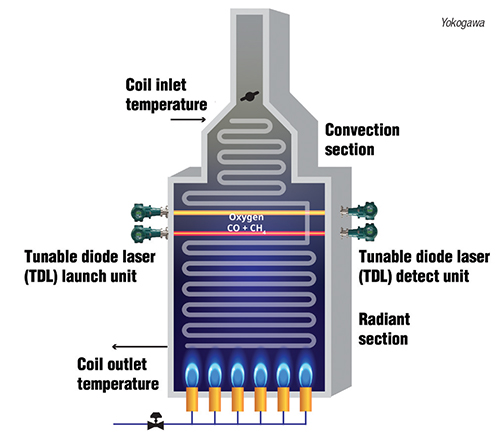A heater assessment study at an olefins plant led to the implementation of a new combustion-control platform in several furnaces to help optimize fuel ratios, improve overall furnace stability, reduce emissions and extend asset lifespan
ORLEN Unipetrol RPA s.r.o. (Unipetrol; Prague, Czech Republic; www.orlenunipetrolrpa.cz) is a leading supplier of petrochemicals and refined products. As indicated by the abbreviation RPA — representing refining, petrochemical and agrochemical activities — Unipetrol supplies a wide variety of products, including bitumen, fuel oils, motor fuels, liquefied petroleum products, oil hydrogenates, olefins, aromatics, agrochemicals, carbon black, sorbents and polyolefins, such as high-density polyethylene and polypropylene. The company also funds research and development and operates its own transportation network.
Like many companies in the chemical process industries (CPI), Unipetrol has demonstrated an increased focus on environmental stewardship by minimizing the consumption of raw materials and energy. This focus led to the selection of a holistic combustion-control solution, the CombustionONE platform offered by Yokogawa Electric Corp. (Tokyo; www.yokogawa.com), to address multiple corporate goals, including increased efficiency, reduced emissions, enhanced operational stability and improved operational safety. With Unipetrol, Yokogawa executed a conceptual engineering assessment, which led to a heater assessment study on a furnace (Figure 1). This defined the scope and deliverables for a pilot project and provided a clear understanding of the platform’s impact and return on investment (ROI). The pilot project ultimately led to a study of the entire olefins plant. After the successful pilot implementation, CombustionONE was deployed at three additional olefin furnaces. The remaining six olefin furnaces and a continuous catalyst regeneration (CCR) reformer in the refinery are in the process of implementing the platform in a subsequent phase, which is currently underway at the site.

FIGURE 1. The CombustionONE control platform was used to support the optimization of fired heaters at Unipetrol’s olefins plant. This resulted in improved yield, decreased coking and better control of fuel ratios, as well as other operational benefits
Tackling issues
Since the project involved multiple disciplines, Yokogawa was contracted to provide a turnkey solution. The core team has been responsible for the initial evaluation, detailed design and implementation of the technology platform. Although many fired assets appear to be similar, each has unique characteristics. Therefore, the CombustionONE platform can be tailored on a case-by-case basis to make the solution appropriate to any type of olefin furnace, even for units operating below 2% O 2 in the fluegas.
For Unipetrol, Yokogawa has provided a single point of contact to address all concerns and incorporate all requirements into the installed system. These include making accommodations for existing third-party equipment and services and incorporating the expertise from all stakeholders to maximize system performance while adhering to the plant operation schedule and milestones.
To ensure maintainability, the platform uses a Yokogawa logic solver that connects to the existing, third-party distributed control system (DCS). This allows annual fine-tuning and the addition of new features without impacting the base combustion controls. All functionalities inherent to CombustionONE can be implemented at any time and activated by operators without the need to restart the DCS. Once updates or improvements are installed, operators can seamlessly start or stop the CombustionONE application.
Impact evaluation
Tangible benefits have resulted from the stability of operation and increased efficiency at Unipetrol’s site, because the CombustionONE technology allows the furnace to safely operate closer to the carbon monoxide (CO) breakthrough point with no concerns about the air-fuel ratio becoming too fuel-rich. The combination of CO-overriding and cross-limit functionalities enhance the safety of operation with the ability to respond very quickly to any disturbances.
The pilot project benefited by having CombustionONE regulatory control logic, as well as advanced process control (APC) technology, which was implemented separately by Unipetrol’s engineers. These complementary applications optimized process parameters, specific consumption and yield while enhancing safety.
Based on the training provided as a part of the deliverables, the actual operating standards were adjusted to better reflect the conditions as they varied during startup and the end of the run.
At the close of the project, performance tests were executed. Estimated fuel savings during the heater assessment study, in which a detailed thermodynamic model was created and validated for actual operational conditions, were compared with post-implementation results, and fell within 4% of predicted improvements. Considering influencing process aspects, such as the feedstock ratios in terms of C2, C3 and C4 concentrations, fuel composition and ambient conditions on furnace liberation duty and efficiency, the outcome for the complete olefin plant proved to be more than sufficiently reliable and trustworthy to justify additional projects.
Additional recognized benefits include the following:
- Increased throughput
- Improved stability concurrent with reduced crossover temperature
- Decreased coking deposits
- Improved asset lifespans resulting from reduced temperature swings
- Improved predictability of the propylene-ethylene ratio
Edited by Mary Page Bailey
Author
 Kevin Finnan is a market intelligence and strategy advisor at Yokogawa Corp. of America (12530 W Airport Blvd, Sugar Land, TX 77478; www.yokogawa.com/us). Prior to Yokogawa, he was an independent consultant, as well as vice president of marketing for CSE-Semaphore and director of marketing at Bristol Babcock. He has over 30 years of experience in a variety of vertical markets and has launched more than 40 products in automation and measurement technologies.
Kevin Finnan is a market intelligence and strategy advisor at Yokogawa Corp. of America (12530 W Airport Blvd, Sugar Land, TX 77478; www.yokogawa.com/us). Prior to Yokogawa, he was an independent consultant, as well as vice president of marketing for CSE-Semaphore and director of marketing at Bristol Babcock. He has over 30 years of experience in a variety of vertical markets and has launched more than 40 products in automation and measurement technologies.
Further reading
1. Process Control: Optimization at the Edge, Chem. Eng., Feb. 2024, pp. 13–16.
2. Advanced Control Methods for Combustion, Chem. Eng., Aug. 2014, pp. 34–39.
3. Facts at Your Fingertips: Industrial Combustion Products, Chem. Eng., Mar. 2018, pp. 30.
4. Burner Technologies & Concepts: Meeting Emissions-Reduction Goals, Chem. Eng., Sept. 2022, pp. 34–39.